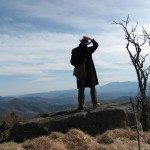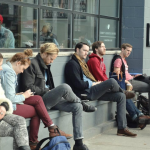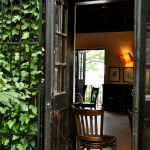Community & Individuals, part 2
 In discussions of human nature, one of the central questions that soon appears is how much of who we are is determined by our biology, our genetic code, how our brains, nerves, & bodies are wired, and how much of it is shaped by our culture, the deliberate and accidental conditioning of our upbringing, the communities to which we belong?
In discussions of human nature, one of the central questions that soon appears is how much of who we are is determined by our biology, our genetic code, how our brains, nerves, & bodies are wired, and how much of it is shaped by our culture, the deliberate and accidental conditioning of our upbringing, the communities to which we belong?
To borrow a phrase I heard our mutual friend Mike use, “It’s a ‘both/and’ sort of thing, not an ‘either/or’ sort of thing.”
Although my area of research is much more focused upon the cultural community social side, I cannot deny that it is closely tied to, even dependent upon, a hard-wiring that makes us capable of being adapted by our environment. Our genetic heritage also seems to make us pre-programmed to live together with others. By nature, we have a long developmental period, which leaves us dependent upon others. Most of the evidence suggests that we have an inborn drive towards interaction with others; we are pulled to nurture and to be nurtured. We are naturally drawn to others like us, and pulled towards living in community. With the exception of some unusual conditions causing sociopathy or developmental delays or other issues, we are capable of empathy and language.
Although we have capabilities for interacting with our world, most of the tools we humans have to make sense of it are derived from our community. Even those that aren’t—those fundamental categories such as time, space, motion, color, cause & effect—these are all skewed and adjusted to fit the tools our community gives us, as well as to meet the need our community presents us with.
Since thinkers first started looking at human nature through the theoretical tool of evolution, the relationship between the individual and their community has proved difficult to deal with. While clearly humans survive as individuals to pass on their DNA to the next generation, is our survival as a species more due to our persistence in groups, much like the survival of other social animals like ants, bees, and termites?
We are, as Aristotle said, sociable creatures, and we are drawn to the society of others. That is our genetics, our conditioning, and our habit. However, as Kant pointed out, we are troubled by a human nature marked by “an unsociable sociability;” we want to be with others, but we also want to be alone. As a species, we seem to be designed with an inner dichotomy of occasionally conflicting ends: we are individuals with individual needs, pleasures and desires, and, as a species, we are also communal, needing to be part of a community’s needs.
drawn to the society of others. That is our genetics, our conditioning, and our habit. However, as Kant pointed out, we are troubled by a human nature marked by “an unsociable sociability;” we want to be with others, but we also want to be alone. As a species, we seem to be designed with an inner dichotomy of occasionally conflicting ends: we are individuals with individual needs, pleasures and desires, and, as a species, we are also communal, needing to be part of a community’s needs.
It’s not even really a “both/and thing;” it is a both/and & more thing.
Persons and groups are constantly engaged, constantly influencing and changing each other. Individuals and communities are in constant conversation, sometimes in a open dialogue allowing both to flourish, sometimes one of control and resistance, mostly somewhere in between. However, just as a community is always more than just a conglomeration of its parts, an individual is always more than just a member of a community.
Since the 80s—ironically, as a pathological individualist in one of the most individualistic decades imaginable—I have been a researcher of, a theorist of, an advocate for, and a member of communities. It seems to me after the isolation, individualism, selfishness, lost-ness and fragmentation of the last few decades, I see many more people moving towards living in community—either accidental communities or intentional communities.
However, as my last post indicated, my 25 years of experimentation have left me uncertain of community as an end in itself. Theoretically, human needs are rather similar and consistent, and forming communities within which these needs are satisfied,
allowing, as my friend Jeffery Nicholas puts it “human flourishing.” However, in practice, humans in groups large or small seem much more complex, and we might consider more flexible social groupings.
It seems to me, instead of being deeply bound to community, instead we have moved towards an individualistic serial sociality, where we connect ourselves to the orbit of a community for extended periods of time, form bonds and relationships, work together towards common goals, but then can shift or even move on. We are not monadic, but we remain nomadic. I think that 25 years ago, I would have critiqued this trend as just another form of individualism—which it is—or as boutique communitarianism or niche tribalism—which it can easily become. I think, however, that serial sociality does satisfy our basic human needs to be part of a group without compromising our own individuality. It also prevents the insularity of belonging to a group and the tendencies to start dealing with other humans through the dualist lens of us and them.
 Healthy socialities form just as easily at workplaces, coffee shops, bars and on the trail as they do in colleges, churches, families, and intentional communities. One might argue that they are not as nurturing or as stable as groups that have a stronger commitment to each other, but I’m not sure that is the case; a bar is as likely to take up an offering for a member in the hospital as a church is.
Healthy socialities form just as easily at workplaces, coffee shops, bars and on the trail as they do in colleges, churches, families, and intentional communities. One might argue that they are not as nurturing or as stable as groups that have a stronger commitment to each other, but I’m not sure that is the case; a bar is as likely to take up an offering for a member in the hospital as a church is.
I have no doubt we need each other; the question is: how?

“Boutique communitarianism” is a great phrase.
Lovely post. I would only add that I think individualism grows most of all out of the recently increased possibility of living as individuals. There were probably plenty of Pleistocene individualists who either got eaten by predators or eked out a bare subsistence and then died alone. They didn’t leave much of a mark.
Modernity brought about the conditions for living relatively free from traditional social constraints while still benefiting from the labor of millions of others. You could go to the market to purchase all of your subsistence needs and then withdraw from further interaction. This allowed some individualists to write treatises and novels, and later emails and Facebook posts and tweets, some of them about the glories of the life apart. Much of this is the opposite of “rugged” individualism. It’s instead the cushy kind. Which is why it’s here to stay.